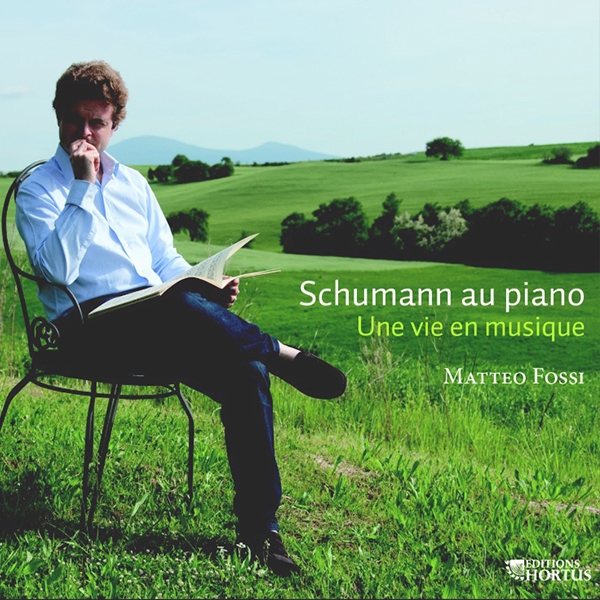Dopo il “Brahms the Progressive” dello scorso anno, ho deciso di dedicare la mia nuova registrazione per Hortus a Robert Schumann, autore di cui ho avuto la fortuna e l’onore di aver eseguito tutta la produzione cameristica.
La scelta di registrare le opere pianistiche raccolte in questo disco rappresenta quindi una necessità artistica pensata e fortemente voluta dopo anni di ricerche.
Come con Brahms, l’intento è stato quello di scegliere dei brani che potessero fornire una sintesi efficace (anche se ovviamente parziale) dei caratteri fondamentali dell’opera schumanniana.
Mai come con Schumann, compositore romantico per eccellenza, si assiste ad una totale simbiosi tra vita e arte, e il contrasto drammatico tra reale e ideale emerge nella sua musica con una potenza espressiva inusitata.
E’ il più “letterario” dei musicisti (Hoffmann e Jean Paul – per dirne un paio - sono per lui più che fonti di ispirazione, i loro personaggi sono veri e propri alter ego), e forse per questo è uno dei più moderni in assoluto.
La sua sconvolgente “attualità” è quindi ciò che mi ha sempre maggiormente impressionato, e il fatto che, unico tra i Grandi, Schumann non sia stato anche straordinario pianista, fa sì che la sua musica sia spesso slegata e libera da qualsiasi riferimento diretto allo strumento, e fornisca per questo all’interprete delle sfide tecniche e musicali incredibilmente affascinanti.
Non voglio entrare nel dettaglio delle tre composizioni che ho scelto per questo disco: ringrazio il Prof. Antonio Rostagno per la sua esauriente disamina storico-musicale, e la giovane scrittrice Maria Paola Colombo per la sua commovente “Fantasia” ispirata alle Geister-Variationen.
Ci tengo però a sottolineare come la scelta di registrare la versione del 1838 dei Kreisleriana op.16 (molto meno conosciuta di quella, definitiva, del 1850) sia stata dettata da ragioni insieme storiche ed emotive: a mio parere, questa prima edizione mostra ancor più dell’altra tutta la portata rivoluzionaria della scrittura schumanniana, ed è molto interessante notare che nessuno, da Chopin a Liszt alla stessa Clara, capirono fino in fondo questo immenso capolavoro.
Alle Geister-Variationen, poi, sono legato da un affetto e una commozione particolare; mi ha sempre colpito nel profondo pensare ad un’opera scritta a cavallo del tentativo di suicidio da parte dell’Autore, e l’ultima variazione è una delle musiche più toccanti che mi sia mai capitato di suonare.
In mezzo, i Bunte Blätter op.99, altra composizione forse sottovalutata, ma piena (a partire dal titolo…) di colori ed emozioni; colori ed emozioni che, come per Brahms, ho pensato che il Fazioli F278 fosse lo strumento perfetto per restituire.
Buon ascolto.
Matteo Fossi
"LA VIA DI FOSSI A SCHUMANN E' INEDITA E SUBLIME. Matteo Fossi, giovane e dotto pianista italiano, ha affrontato un'impresa che lo immette in un filone interpretativo tra i più importanti della musica del nostro tempo [...] Fossi si è posto nell'atteggiamento di chi cerca di trovare altre vie, altre soluzioni, e la sua dedizione appassionata al lavoro di Schumann è per l'ascoltatore motivo di soddisfazione profonda [...] Fossi ha registrato l'immortale capolavoro della Kreisleriana op.16 quasi tentando l'impossibile, la soluzione cioè di quel dilemma, che proprio nella sua sublime enigmaticità tocca i vertici dell'Arte."
Claudio Strinati, il Venerdì di Repubblica
"[...] Abile disegnatore di programmi monografici e "a tema", Fossi pone giustamente e Geister-Variationen a completamento di un percorso in cui tutto ciò che è il non-detto e consegnato ai posteri è detto anzi affermato con vigore propositivo, e con uno slancio para-rivoluzionario che la prima versione (1838) di Kreisleriana aiuta a captare con l'evidenza che l'esecuzione mette bene a fuoco."
Angelo Foletto, Suonare News
ACQUISTA:
acquista

